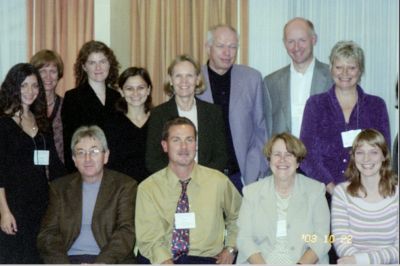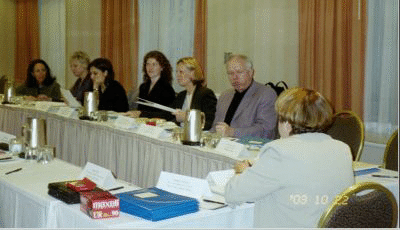International Meeting Report
Auckland, New Zealand – September 2004
Presentations
The second Intercamhs International Meeting, held in Auckland, New Zealand, in September, included presentations on different aspects of mental health and schools
The opening presentation was given by Dr Paul Brounstein from the US Substance Abuse and Mental Health Services Administration (SAMHSA), which generously provided the seed money to launch Intercamhs and made this meeting possible. He spoke of the key role of schools in promoting and protecting the mental health of a community. Although his remarks were set in a US context, his message was internationally relevant. Here is a summary:
Transforming the Mental Health System in America: Schools are Integral
Paul J. Brounstein, Ph.D. Senior Public Health Advisor, Center for Mental Health Services, Substance Abuse and Mental Health Services Administration, USA
The final report of the President’s New Freedom Commission on Mental Health, Achieving the Promise: Transforming Mental Health Care in America, has made clear that the current Mental Health System “is broken.” The report asserts: “To achieve the promise of community living for everyone, new service delivery patterns and incentives must ensure that every American has easy and continuous access to the most current treatments and best support services. In a transformed system, consumers and family members will have access to timely and accurate information that promotes learning, self-monitoring, and accountability. Health care providers will rely on up-to-date knowledge to provide optimum care for the best outcomes.” This simple statement, if followed by action, will require that Federal, State, and local institutions providing relevant services rethink mental illness as affecting (and affected by) individuals living within family systems, existing within community systems, which in turn are nested within policy and funding systems at the state and Federal level.
Schools and faith-based institutions once played a central role in the life of communities across America. These social hubs provided time and place for sharing and reinforcing social values, providing sometimes formal, sometimes informal screening activities for health and well-being, and served as a source of referral and assistance for individuals or families in need. However, changing demographics; mobility; technology-inspired isolation; vagaries in the public budget; and the rising cost of living that requires caretakers to work more hours at more jobs have all led to a decrease in the role that social institutions play in helping to ensure individual, familial and community physical and mental well-being.
To succeed, transformation efforts must take advantage of schools being a nexus point for children and parents/caretakers. Schools need to be re-engaged, through workforce development and by their embracing and acting on the knowledge that physical and mental health are required for improving school morale/climate, safety/security and academic achievement. As part of the transformation effort, states will be encouraged to ensure schools broaden their efforts and abilities to effect screening, early intervention and referral as appropriate, and build into their institutions a lasting knowledge that academic achievement, as the primary goal of the educational system, cannot itself be achieved if individuals and families do not receive the assistance they may need regarding their mental health. Schools again need to take up the mantle of a caring and involved community hub.
More information:[email protected]
Here are brief summaries of the other six presentations, together with details of where to find further information about them.
Partnerships for Sustainability
Prof Louise Rowling, President, Intercamhs
A mantra for action in the health field is: Think globally, Act locally. For Intercamhs, a reversal of this statement, Think locally, Act globally, exemplifies our work. We come from diverse countries and perspectives. We have our own local knowledge, but endeavour to pool that knowledge and share and synthesize it for global action. This necessitates partnerships.
There already exist partnerships between sectors such as justice, health and education. These have developed due to knowledge of the common influencing factors for crime, drug use and low academic achievement. Mental health professionals acting alone will not enhance learning or strengthen schools. There needs to be some sense of working for the sustainability of school based mental health. Sustainability must be considered at the beginning of action with schools. At the heart of sustainability is building the capacity and confidence of stakeholders, utilising their different strengths and priorities and celebrating the diversity of perspectives, not trying to implement a standard project. Five elements for partnerships are: shared vision; leadership; resources; time; and organisational development.
Intercamhs is developing a structure so that our combined voices – including those from less resourced countries – can influence political agendas.
More information: [email protected]
Overview of Deployment Family Support to the U.S. Army 25th Infantry Division
Dr Michael Faran, Tripler Army Medical Centre, Hawaii, USA
The 25th Infantry Division, which is based in Hawaii, has deployed for a projected 13-month tour in two waves involving over 10,000 soldiers: the first half left in January to Iraq and the second half left in March/April to Afghanistan. Approximately 25,000 family members, including about 800 pregnant mothers remained behind, most of whom have stayed within the state. Military children and their families face several unique challenges in Hawaii: they are isolated by several thousand miles from relatives, live in a culturally divergent community, and face a very high cost of living. A multidisciplinary system coordinating various agencies was developed to provide a wide range of support to children and adults and is unique to the Army. This presentation provided an overview of ongoing efforts to care for military families during the deployments. It included brief descriptions of the school based mental health program, support to the Family Readiness Groups, the extensive outreach of Army Community Services and the coordinated behavioral health support at Tripler.
More information: [email protected]
East meets West – promoting the mental health of all children
Chris Bale, Director, Partnership for Children, UK
Zippy’s Friends is a whole-class mental health promotion programme which focuses on teaching coping skills to six and seven year olds. It is running in schools and kindergartens in six countries and more than 20,000 children have taken part. Evaluation results are strong and further major expansion is expected in 2005.
The experience of launching the programme on three continents may be useful in the development of other international programmes. Among the lessons learned are:
- · Cultural adaptation is much less of an issue with young children than it might be with teenagers.
- · All over the world, there is huge pressure on the school curriculum, even for very young children.
- · Delivery structures and funding sources vary enormously from country to country.
- · If we want to make progress in promoting the mental health of children around the world, we must look at low cost models.
- Zippy’s Friends is beginning to show that it is possible to develop truly international, cross-cultural programmes that produce real benefits for children. Initially, it’s an expensive exercise, but in the long-term it makes good resources available to countries and schools that would never be able to develop them alone.
More information: www.partnershipforchildren.org.uk
Digital Learning: Interactive Multimedia and Mental Health Literacy
Reg Davis, Senior Clinical Psychologist/School-Link Coordinator, Central Coast Health, NSW Australia
Mental health promotion in schools is a challenge – how to communicate accurate up-to-date information, how to raise issues that challenge beliefs and attitudes, and how to engage young peoples’ interest in issues relating to emotional wellbeing. It involves developing an emotional literacy that allows self understanding and an ability to relate to others which enhances social connection and relatedness.
Interactive multimedia is increasingly being used to promote mental health because it enables young people to use skills acquired through computer gaming, including spatial recognition, multi-tasking, enhanced attention capacity, and the ability to rehearse decision making and problem solving in low-threat virtual environments. It is visually engaging, action oriented, self-paced and able to be repeated again and again. It also matches the social culture of youth with its focus on intensive multimedia experiences, and engages young peoples’ imagination and creativity.
Multimedia games have been used in education around physical illnesses, such as diabetes and asthma. They are increasingly relevant for mental health – around specific issues like reducing stigma, as clinical tools for treating depression, and to promote resilience with students in transition from primary to middle school.
More information: www.yppicentre.com
Cultural Diversity Training for Mental Health Staff
Jenni Jennings and Ben Anderson, Youth and Family Services, Dallas Public Schools, Texas, USA
Jenni Jennings and Ben Anderson presented a 20-minute session on their cognitive contextual model of group work. The focus of the session was one of the ten sessions in the series. The session was interactive with the conference attendees, who participated in a Peer Pressure activity that involved a multi-sensory approach to enhance learning. Jenni and Ben discussed their cognitive contextual model that includes:
- · Orientation to the present and future
- · Emphasis on fun, play and laughter as learning/healing tools
- · Offering structure as a viable solution
- · Offering clear and direct guidance.
- Feedback was positive, and two groups from Australia and one group from Ireland were interested in learning more about the work at future conferences.
More information: [email protected]
Providing Mental Health for Traumatized Former Child Slaves, Prostitutes and Soldiers
Patrick Schoof, Executive Director, Youth Advocate Program International
The presentation began with an introduction to the State of the World’s Exploited Children (the worst forms of child labor, including hazardous labor and enslavement, the commercial sexual exploitation of children, and the use of children in conflict) to assist attendees in understanding that these atrocities are common worldwide, and are growing numerically and geographically.
Attendees were then informed that the children who escape these atrocities, by whatever means, rarely have services available to them (transitional homes, counseling, trauma and rehabilitation services, and reintegration facilities and programs). As a result, many of these children have a difficult time adjusting to their previous lives, their families and their communities, and often grow up to become traumatized adults.
Hence, the presenter introduced the idea of developing a partnership between the mental health community and non-governmental organizations. The partnership would be to design strategies and plans to better aid these children, and then write international program grants that would be better designed and more likely to receive funding than a single-sector approach.
More information: www.yapi.org
![]()
![]()





